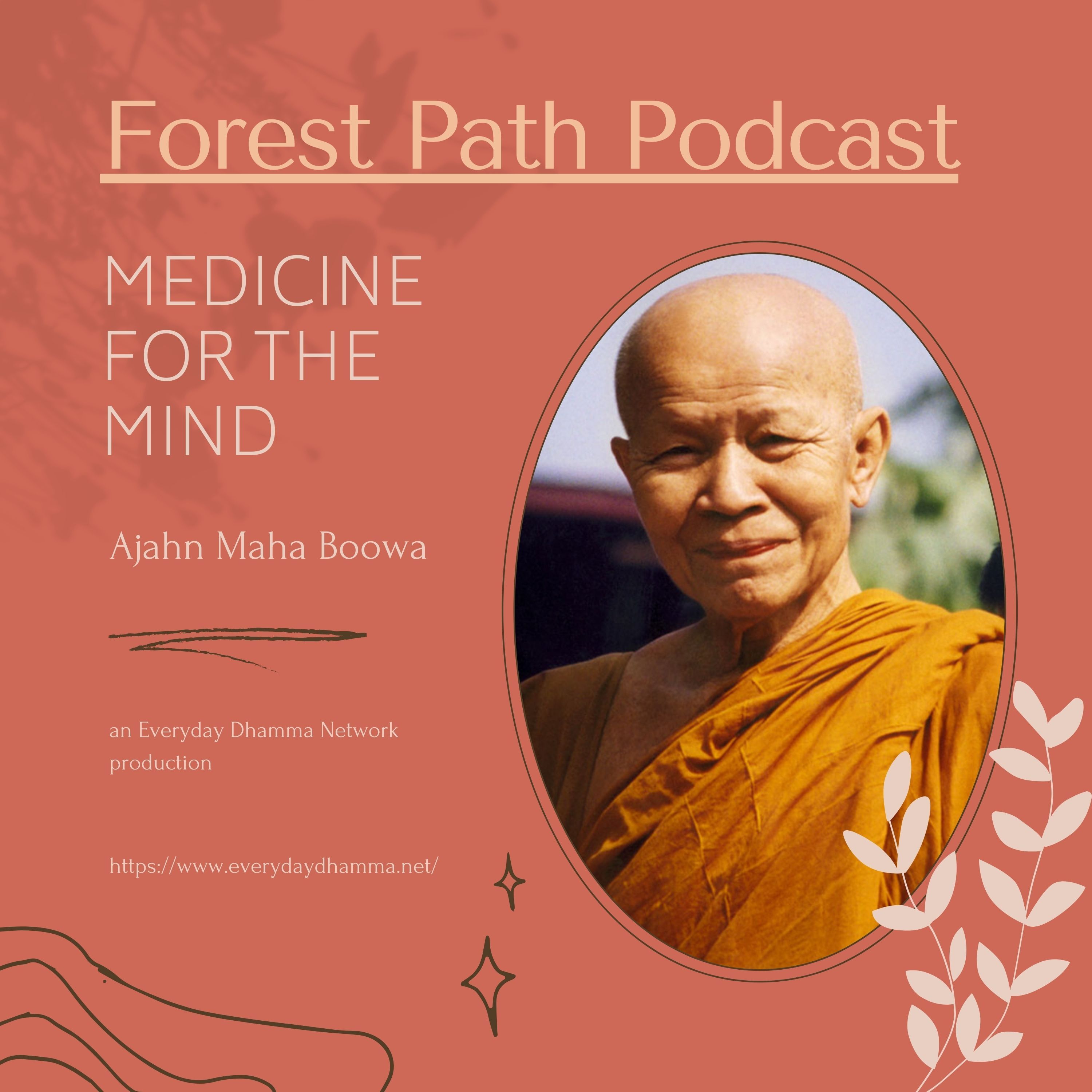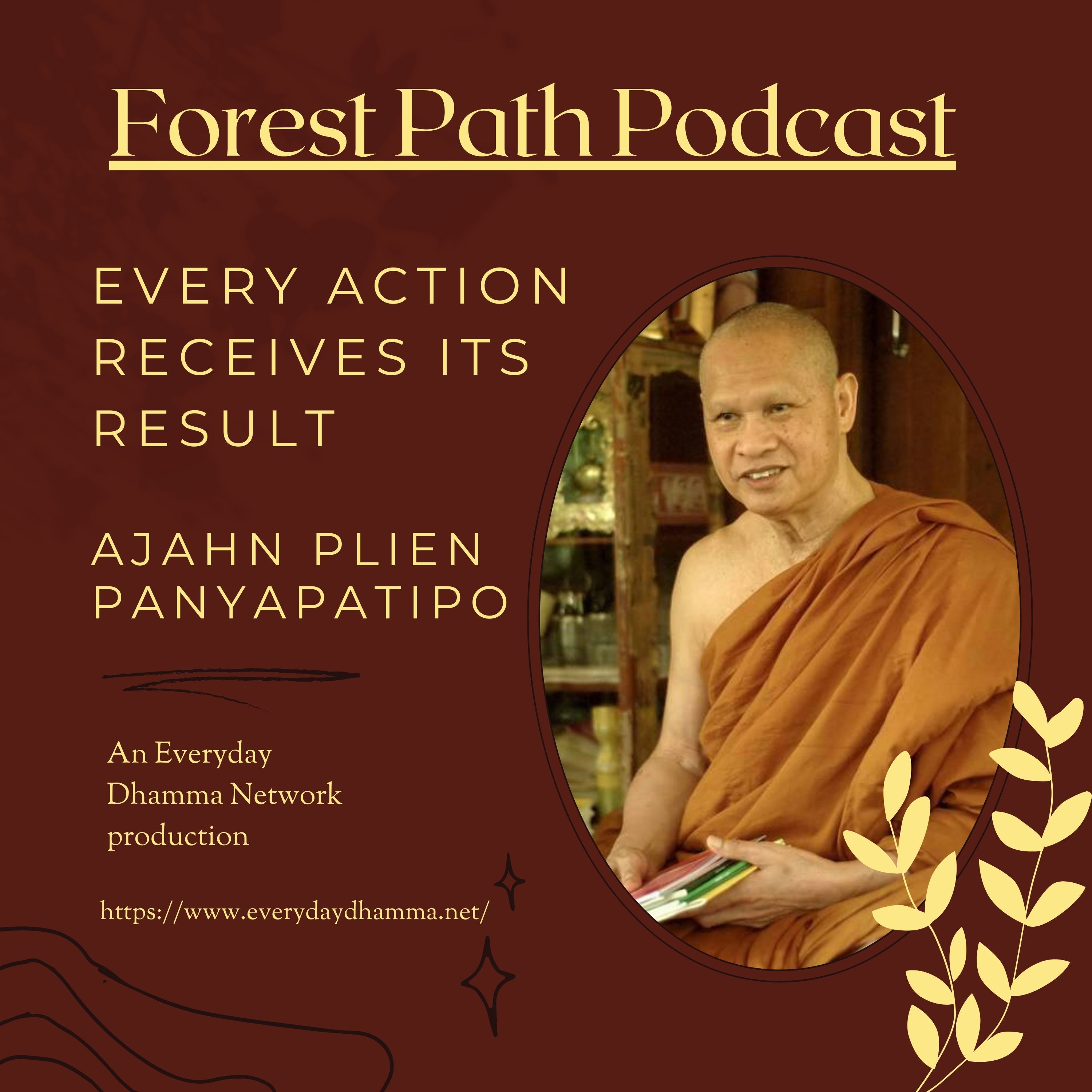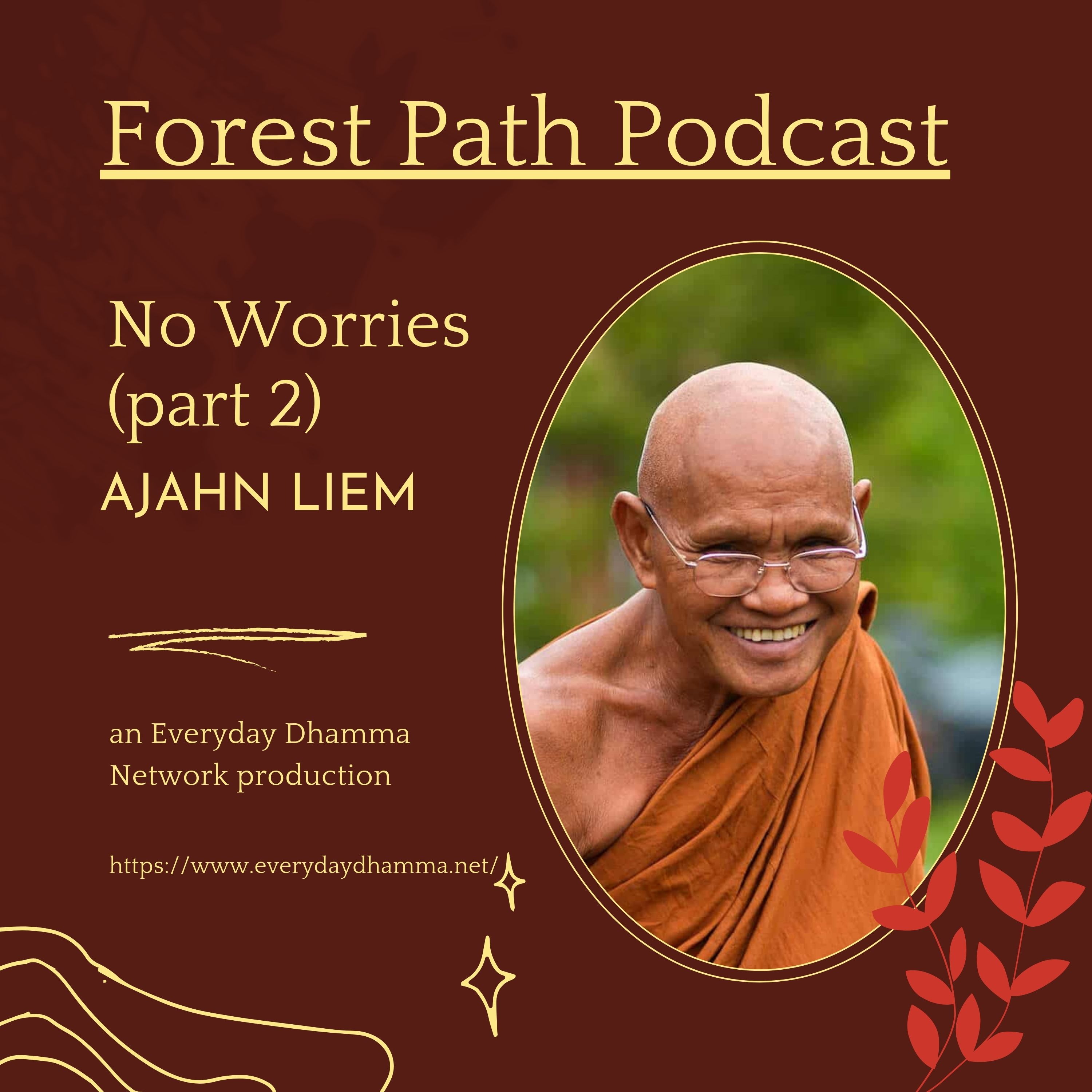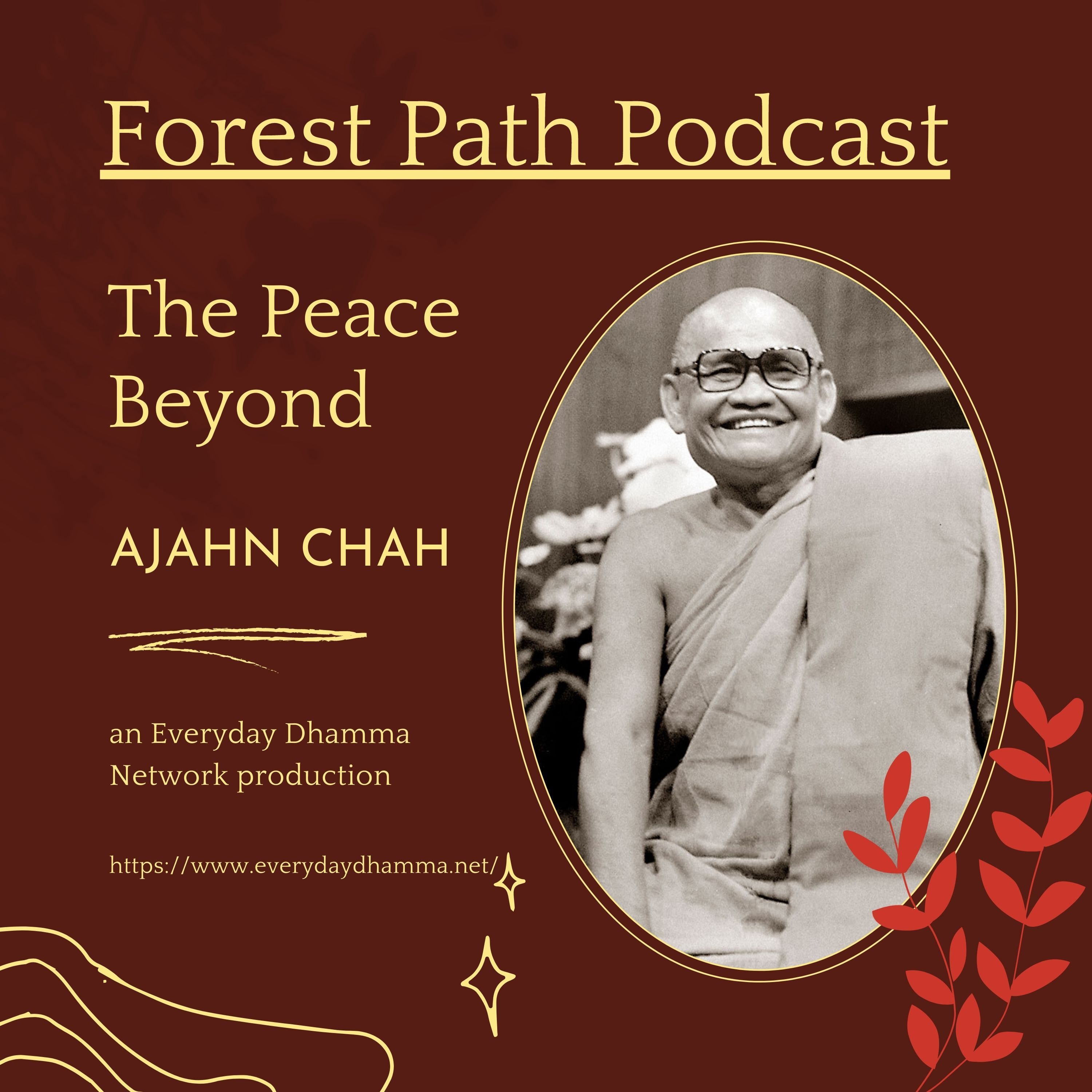Episode Transcript
Medicine For The Mind
by Ajahn Maha Boowa
This world of ours – no matter how hot and feverish it may get – still has the teachings of the Buddha to cure its ailments. At the very least, it has the religion as a medicine to relieve its suffering to some extent. Suffering resembles a disease in that no matter how serious it may get, we can gain at least some relief if we have medicine to treat it.
If the hearts of the world – our hearts – take their orders only from defilements and suffering, then no matter what our race, class or nationality we won’t be able to find happiness and peace in the world at all, because our hearts have no Buddhist teachings to give them relief.
Buddhist teachings are teachings that adhere to the principles of cause and effect. In its most basic sense, the Buddhist religion means cause and effect combined. To believe in the religion means to believe in the correct principles of cause and effect, and not to resist them. If we practice in line with these principles, there will be a way to reduce the pain and suffering of the world, both within and without.
People who don’t have any religious principles inside – no matter where they live, no matter how well-educated or how wealthy they may be – cannot find any happiness. They cannot set down the burdens of their hearts for even a moment because they have no place to set them down. Where could they pos- sibly set them down? All they have is a flaming mass of defilements, made up of their insatiable desires. Each of their desires creates pain and suffering, which then turns around to burn them. But for the most part, they fail to meet with the things they want, and instead keep meeting with things they don’t want. This is the direction in which the defilements lead the beings of the world.
But when we let the power of cause and effect – the power of the Dhamma – take the lead, then even though we meet with some pain and difficulties by going against the defilements when following the way of reason, the even- tual results will give us enough happiness and pleasure to relax and unwind our sufferings. This is why the religion is an extremely essential teaching for people’s hearts. We human beings – who are more intelligent than the other beings of the world – should have the teachings of the religion as a treasure to adorn and protect our thoughts, words and deeds, making the various aspects of our behavior beautiful to the eye and cooling to the heart.
The religion is an offshoot of pure Dhamma. It branches off from the superlative Dhamma – the marvelous Dhamma discovered by the Buddha – and takes the form of a prescription that says, “Do this… Don’t do that,” and so forth, so that we can follow it and not be at odds with the path of Dhamma. Once we trust the principle of cause and effect, then no matter how difficult the path may be we give it our best, even when it goes against the grain. Actually, going against the grain means going against the defilements, which are the enemies of the Dhamma. In other words, doing those things that are in keep- ing with the Dhamma goes against the grain of the defilements. So happiness, peace and calm are bound to follow.
I’ll give you an example: Suppose you think about something today that gets you all worked up and upset. Your entire heart becomes a mass of flame. This is especially true if it is something that has really annoyed you and made you indignant. The mind gets wrapped up in the things that annoy it and make it upset. Day and night, sitting, standing, walking and lying down, you won’t let them go. You take them, instead of your meditation object, as your preoccupa- tion, so how can the result be happiness? It has to be fire, burning continuously – because the matter itself is fire, and your thoughts about it are fire, so how can you expect them to result in any ‘water’ at all? They’ll have to result in more fire; there are no two ways about it. The more you persist in dwelling on them, the more you damage your own heart. The final result is that you can’t eat or sleep and hardly have enough presence of mind to put a stop to your thoughts. There are many cases where people go crazy in this way, destroyed by the things they think about.
What causes this destruction? Affairs of the defilements, not the affairs of Dhamma. For this reason, when you resist thinking about bad things, when you block bad trains of thought with mindfulness and break them off with wisdom – even though it’s difficult and goes against the grain – the result you can expect is mental peace, or at least enough mindfulness to contemplate the proper path to follow. You can then evaluate what’s right and what’s wrong concerning the topic you’ve been thinking about and see why you felt compelled to think about it in the first place. “You know it’s no good, so why think about it? Can’t you straighten yourself out for your own good?”
This is how reason – the principle of cause and effect – deals with the matter. All its deliberations are for the sake of seeing the harm of those preoc- cupations, since pain and suffering are already clearly obvious in the thoughts of your hot and troubled heart. “If you persist in dwelling on it any further, what’s going to happen to you? As it is, the suffering is already blatant. If you keep thinking in that way, won’t it grow until it overflows your heart? How will you be able to hold up under the strain? If you keep thinking in that way, the suffering will just keep growing. Where will you find the strength to withstand the suffering your thoughts keep churning out about the things that have you so upset? Are you still going to keep thinking about them? Are you still going to keep piling more and more suffering on yourself?”
Just thinking in this way is enough to bring the mind to its senses. And as soon as the mind comes to its senses, it can begin to calm down and rein itself in. It can try to let go of that preoccupation by using reason to push itself away and bring its thought processes under control. The suffering that resulted from those thoughts will also be brought under control, because the causes – those hot, burning thoughts – have been curbed. And you’re able to curb them be- cause mindfulness has reined them in. This is enough to show that your ability to resist those thoughts with mindfulness and evaluate them with wisdom gives calm and peace to the heart. And at that point, the suffering is curbed and dis- appears.
Although the heart can be hard to restrain, hard to control, we should try to think up strategies for unburdening it in this way. Admittedly this is difficult, but it’s a difficulty of the right path, for it results in well-being and happiness.
The affair is no longer troubling and upsetting, so our sufferings stop piling on. We have a chance to relax and unburden ourselves of those burning embers – pain and suffering in the heart. This is one principle we can use in evaluating all the bad things that come our way.
For example, suppose that people curse you or spread gossip about you. You don’t know how many days, how many months ago that curse or that gossip passed through their lips and out of their memory, but you find out about it to- day and immediately get upset. Actually, you don’t know how many months or years ago the breath with which they cursed you or gossiped about you passed through their lips, but now a new breath passes through somebody else’s lips and into your ears: “They said this about you… Mr. X and Ms. Y said these aw- ful things about you.” This second breath is the one you grab onto for no good reason and end up burning yourself with it. This is because of your own wrong assumptions. If that second person hadn’t told you, your heart would have been perfectly fine, even though those other people actually said those things about you. At the time it happened, you didn’t feel anything at all, because your heart hadn’t stirred itself up to be aware of those things. Your mind was in its normal state, unaffected by pain or distress.
If we’re mindful when people say these sorts of things, we immediately realize that nothing good can come of it, so why should we grab hold of it to defile the mind? We’ve already had experience with dirty things, haven’t we?
When we walk along a road and come across something dirty, we give it a wide berth. We don’t want to touch it, not even with the soles of our feet, because we know that there’s nothing good about it. If we touch it, we’re sure to get dirty too. So why do we like to let the mind roll around in things we know are dirty? Why do we like to mess with them and think about them? It’s stupid to let ourselves get worked up over such things to the point where the entire mind is defiled and burning hot.
When we think in this way, we can put a stop to those thoughts and con- cerns. The moment we start thinking about them again, mindfulness is there – quick and alert – so that we can let them go, instead of holding onto them to burn the heart again and again.
If you use this principle of Dhamma as a medicine to protect yourself in all your activities, your mind can keep its equilibrium and will rarely ever harm itself with the things that make contact through your senses of sight, hearing, smell, taste and touch. Even if the thoughts that arise exclusively in the mind disturb you with unpleasant memories from the past, you’ll be able to shake them off immediately because mindfulness and wisdom are right there with the heart. You get immediate results as soon as you put them to use. Problems arise only when we completely forget our protectors – mindfulness and wisdom – and let bad things come in and trample our hearts so that we must endure the resulting pain. If we could admit the fact that suffering comes from our own stupidity and heedlessness, there would be no reason to complain about it.
In fact, people all over the world do complain. Why? Because they don’t want to suffer. If they don’t want to suffer, then why do they keep thinking in ways that lead to suffering? Because they aren’t alert to what’s happening inside themselves. When this is the case, what can they use to be alert to these things? They have to use mindfulness and wisdom to keep up with what’s happening inside the mind. In that way, they can hold on to at least something for them- selves in the beginning stages of the practice. With constant practice, they’ll eventually be able to keep up with everything that happens inside the mind.
This is how we use Buddhist principles to deal with our minds. If all of us in the world used reason as our guide, in both our internal and external affairs, we would all understand and avoid anything that posed a danger to us indi- vidually or to the common good. We wouldn’t persist in destroying ourselves and others by flirting recklessly with dangerous mental states. At the same time, we’d reflect in ways that produce benefit to ourselves and the common good. The whole world would prosper and flourish, and we’d all be happy and at peace. When we take Buddhist principles as our guide, they lead us in the di- rection of peace through correct practice in line with the principle of cause and effect, which is a universal principle leading to the prosperity of the world.
This is why the religion is something essential for enabling us to live to- gether. In the present, we can be happy and secure, free from trouble and tur- moil in body and mind. If the religion spreads out through society so that each person feels this way, the world will be at peace. When we turn to consider the future state of the mind – what trouble can the mind come to when it holds to reason as its basic principle, when it has Dhamma within? After all, the mind itself produces its own troubles. So if it doesn’t produce trouble for itself, and if it has the Dhamma as its protection, then no matter what world the mind goes to after death, it won’t be oppressed by pain and suffering.
The principles of Dhamma teach that a mind possessing inner quality is unlikely to be reborn in a place where it will meet with suffering and pain, be- cause it hasn’t made the type of kamma that could force it to go there. All it has is the goodness – the inner worth – that will support it and convey it to good destinations, one after another. That’s what its future holds in store.
A person who practices Dhamma, who has Dhamma in the heart, is far different from a person without any Dhamma. Even though they both may live in the same world and have the same sort of appearance, the differences in their knowledge, thoughts, views and actions are enormous, so there is no way they can expect to receive similar results. The results must differ just like the causes. This has been true from time immemorial.
This is why the Buddha said: “Kamma is what differentiates beings, from the basest to the most refined.” These differences do not arise from anything outside of kamma, which is why kamma is the biggest issue facing living be- ings. Why is it big? Because each of us is constantly creating kamma. Even if we don’t realize that we’re creating kamma, the good and bad results that come from our actions cannot be avoided.
What is kamma? The word kamma means action. Our thoughts are called mental kamma; our words, verbal kamma; our deeds, bodily kamma. In each case, we are the ones who constantly perform such actions, so how can we expect to prevent the consequences of those actions from arising in the future? And as we are constantly producing good and evil actions, the moral conse- quences of those actions have the power to determine where we will be reborn in the future. In this respect, there’s no power acting over and above the results of the kamma we ourselves have made. There’s no power greater than the re- sults of our own actions. These results are what support us or oppress us after the kamma has been done. This is what the principles of the religion teach. They don’t have us believe in the power of anything outside of the good and bad activity of our thoughts, words and deeds. This is where our insurance and our guarantee lie. So this, and only this, is what can either destroy or help us. Nothing else can destroy or help us at all.
Our bad thoughts, words and deeds are the means by which we destroy ourselves. Our good thoughts, words and deeds are the means by which we help and foster ourselves. The way which we can ensure that we won’t fall into undesirable situations lies here, and only here – in the principle of kamma. There’s no power higher than this, which is why we shouldn’t harbor unreason- able fears about this or that.
The things we should fear most are any thoughts, words and deeds which create dangers for us. We should realize that the true danger is what’s coming out in our thoughts, words and deeds right now. If we aren’t willing to come to our senses and straighten ourselves out, these acts will constitute the most seri- ous danger we face, not only now but on into the future, until the kamma we’ve done reaches the end of its power and effectiveness. That’s when the danger and suffering will end.
If we believe in the religion, we have to believe in the principle of kamma and the results that spring from it. Is there anyone among us who has gone be- yond creating kamma? No one at all. Each of us has to create kamma. Whether or not we believe in Buddhism, we’re all creating kamma. It is a principle of the nature of action inherent within us, a principle of cause and effect cor- rectly taught by the Buddha when he said that all of us have our kamma. We can believe this or not as we like, but that has no power to erase the truth of kamma. There is no way that either kamma or its results can be erased. Kamma has to remain as kamma and give good or bad results throughout each lifetime. There’s no power above kamma and its results, which come from our own good and bad actions. So we shouldn’t harbor blind and unreasonable fears. If you’re afraid of hell, you should be afraid of the pit you’re digging right now in your heart. That’s the important one, the real pit of hell!
The factor that causes the fires of hell to burn you is right there in your heart. So come to your senses and use mindfulness and wisdom to investigate the fac- tors of your mind that are think- ing wrongly and creating danger, or thinking rightly and creating inner quality within your heart. Make your choices here and follow them through carefully so that there will be no more dangers for you or any other beings in the world.
So then. Is the religion really necessary? Right here is where we should decide. The person who taught us the religion – the Buddha – fully knew the ways of kamma and its results. There’s no way you can dispute with him. He knew everything of every sort concerning his own kamma and that of other living beings, as well as the results of his own kamma and that of all living be- ings throughout the three levels of existence. No one else can even try to reach the full extent of his knowledge of kamma. He proclaimed these truths so that we could conduct ourselves without error – unless of course we go against his teachings by doing things that are bad, so that the results end up going against our wishes and lead to disappointment and suffering. Right here is where the basic principle lies.
Which is why I said: If we in the world have the teachings of the religion in our hearts, then no matter how much suffering we meet, we’ll have a place to put it down. It’s comparable to a disease. If we can treat it with medicine, instead of simply letting it follow the full course of its strength, there’s a chance for us to recover.




